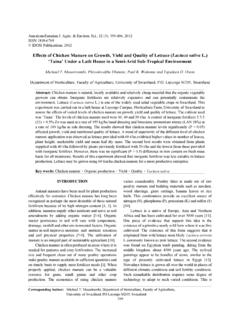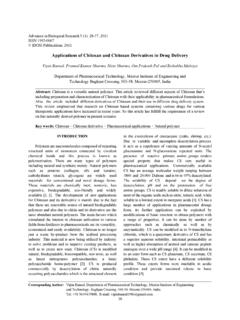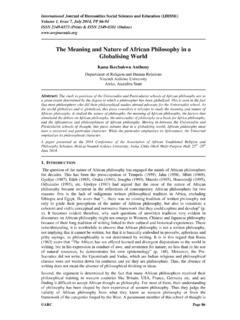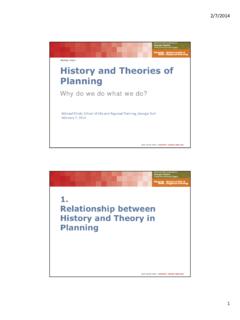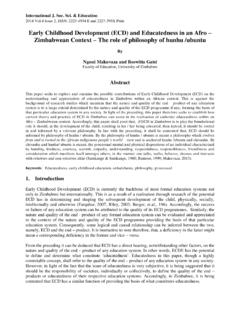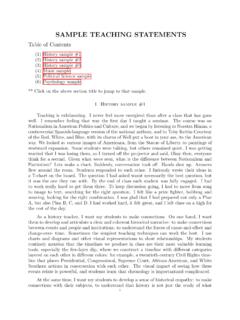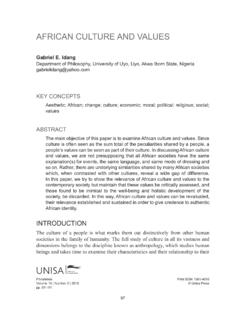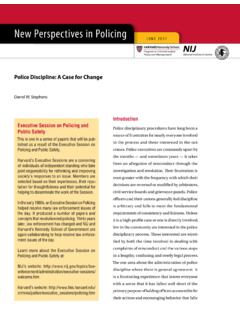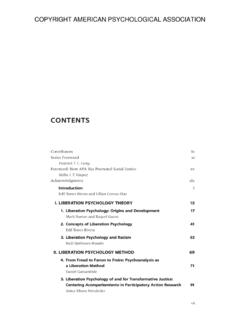Transcription of On Defining African Philosophy: History, Challenges and ...
1 Humanity & Social Sciences Journal 3 (1): 57-64, 2008 ISSN 1818-4960 IDOSI Publications, 2008 Corresponding Author: Dr. Olatunji A. Oyeshile, Department of philosophy , University of Ibadan, Ibadan, Nigeria57On Defining African philosophy : History, Challenges and PerspectivesOlatunji A. OyeshileDepartment of philosophy , University of Ibadan, Ibadan, NigeriaINTRODUCTIONThe definition of philosophy has remained a perennial philosophical problem and there is little agreement as to whatit is. Rather, what many seem to agree on is the descriptions of philosophy , that is, what it encompasses which willprovide the basis for our definition. In the same vein, it has been difficult to define what African philosophy is, rather mostphilosophers have contented themselves in describing what African philosophy is.
2 According to Sogolo, the controversyover what constitutes an African philosophy tends to dominate sometimes so much that it forms almost the entire contentof the course [1].In this paper, the attempt is to say what African philosophy is, inspite of the seeming unending polemics in thesphere and practice of African philosophy . In doing this, we shall start by attempting to describe and possibly define whatphilosophy is. Subsequently we shall be in a position to define African philosophy by looking at the origin of the debateon African philosophy which was as a result of the charge of irrationality leveled against the Africans. Let us recall thatmany European scholars mostly anthropologists and sociologists in the like of E.
3 Durkheim, Auguste Comte, James Frazer,Sigmund Freud, Malinowski, Max Muller, Herbert Spencer, Edward Tylor and even Levy Bruhl, have attempted to givean answer to what the African traditional world views were through their theories on religions of the primitive people. Forinstance, Levy Bruhl rejected the rationality of the primitive people and claimed that they were largely pre-logical and thatwhat their practices point to is a kind of symbolism. We reject the postulations of these scholars, which were largely anthropological, psychological and sociological as thephilosophy of the primitive people or Africans. In the same vein any attempt by contemporary African philosophers topresent a purely descriptive, conjectural account of the African worldview as African philosophy will also be rejected.
4 Weconclude that African philosophy consists in speculative, conceptual and analytical as well as the critical examination ofthe African traditional thought in the light of contemporary global on African philosophy : According to Paulin J. Hountondji, philosophy can be regarded as the most self-conscious of disciplines. It is the one discipline that involves by its very nature a constant process of reflection upon process of self reflection, inherent in the nature and practice of philosophy bears not only upon its purposes,objectives and methods, upon its relation to the world and to human experience in its multiple expressions, upon its statusamong other disciplines and forms of intellectual pursuit and discourse, but also, most radically upon its very nature as anactivity and as an enterprise.
5 The view of philosophy as a critical activity whose function embraces an interrogation of itsown nature and meaning is undoubtedly a legacy of the Greek philosophers[2]. It is worth noting that African philosophyaccording to Hountondji, bears a direct relation to history and culture and that the reflection of African intelligentsia uponour total historical being represents a significant moment in the intellectual response of Africans to the challenge of westerncivilization [3].Humanity & Social Sci. J., 3 (1): 57-64, 200858An attempt to define African philosophy can help in understanding philosophy itself. philosophy can bedefined and at the same time be described as the critical examination of the ideas which men live by Staniland [4] suchas the idea of justice, morality, political and religious ideas, even the idea of God, average men, perfect men and so this critical examination, the philosopher engages in conceptual analysis of the issues involved and in doing this,the philosopher has the tool of logic solidly at hand.
6 When we talk of conceptual analysis, for instance, of the principleof induction, we are looking for the validity or otherwise of the universal claim made as a consequence of examiningparticular instances. The conceptual issue arises as a result of the fact that the instances examined in inductive argumentare not exhaustive of all the classes involved. Hence, the philosopher is apt to reject the universality of the claim of European Scholars on the African Conception of Reality: There were various attempts to engage in theinterpretation of the religious world views of the so called primitive people by European scholars mostly to Evans Pritchard, these theories are no more than plausible and even, as they have been propounded,unacceptable in that they contain contradictions and logical inadequacies, or in that they can not be observed or provedeither true or false and because, ethnographic evidence invalidates them [5].
7 Max Muller in his own interpretation believes that things that are intangible like sun and the sky gave men the ideaof the infinite and also furnished the material for deities. He did not wish to be understood as suggesting that religion beganby men deifying grand natural objects, but rather these gave him a feeling of the infinite and also served as symbols for was chiefly interested in the gods of India and of classical world, though he tried his hands at the interpretationsof some primitive material and certainly believed that his explanations had general validity. His thesis was that the infinite,once the idea had arisen, could only be thought of in metaphor and symbol, which could be taken from what seemedmajestic in the known world, such as the heavenly bodies, or rather their attributes.
8 But these attributes then lost theiroriginal metaphorical sense and achieved autonomy by becoming personified as deities in their own right. So religions mightbe described as a disease of language , a pithy but unfortunate expression. To him the only way we can discover themeaning of the religion of the early man is by philosophical and etymological research which restores to the names of godsand the stories told about their original sense [6].Herbert Spencer is of the belief that the primitive man is rational and given his small knowledge, his influences arereasonable, if weak. The primitive people had no idea of natural explanation as though they could have conducted theirvarious practical pursuits without it. It is dreams, which are real experiences to primitive peoples, which chiefly gave manthe idea of his own duality and he identified the dream self which wanders at night with the shadow-self which appearsby day.
9 This idea of duality is fortified by experiences of various forms of temporary insensibility, sleeping, swooning,catalepsy and the like, so that death itself comes to be thought of as only a prolonged form of insensibility. And if man hasa double, a soul by the same reasoning so must animals have one and also plants and material objects. The origin of religionhowever is to be looked for in the belief in ghosts rather than in souls. Spencer also believes that ancestor worship is theroot of every religion [7].Tylor stressed the idea of the soul rather than of ghost. Both the ghost theory and soul theory might be regarded astwo versions of a dream theory of the origin of religion. Primitive man then transferred the idea of soul to other creaturesin some ways like himself and even to inanimate objects which arouse his interest.
10 The soul, being detachable from whateverit lodged in, could be thought of as independent of its material home, whence arouse the idea of spiritual beings, whosesupposed existence constituted Tylor s minimum definition of religion and these finally developed into gods, beings, vastlysuperior to man and in control of his destiny. It should be noted that in the absence of possible means of knowing how theidea of soul and spirit originated and how they might have developed, a logical construction of the scholar s mind is positedon primitive man and put forward as the explanation of his beliefs [8].Humanity & Social Sci. J., 3 (1): 57-64, 200859 Durkheim in his sociological theory believes that religion is always a group, a collective affair and that there is noreligion without a church.

